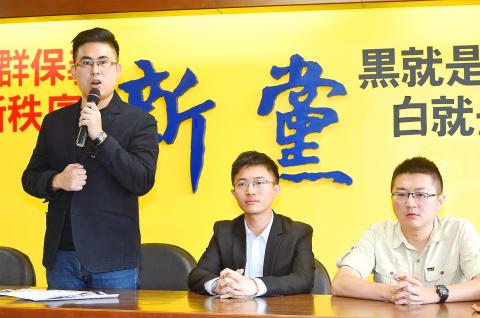New Party spokesman Wang Ping-chung (王炳忠), his father, and New Party youth wing executives Ho Han-ting (侯漢廷) and Lin Ming-cheng (林明正) were indicted yesterday after prosecutors said they found evidence of espionage and Chinese funding.
The three New Party defendants “had endangered national security and social stability by developing an organization for use by the Chinese government and its military” in contravention of the National Security Act (國家安全法), the Taipei District Prosecutors’ Office said.
Wang’s father, Wang Chin-pu (王進步), was charged with being an accessory to espionage and other illegal activities conducted by the other defendants.

Photo: Cheng Hung-ta, Taipei Times
Prosecutors said they uncovered evidence of money transfers from China to the three party members to work with convicted Chinese spy Zhou Hongxu (周泓旭) in his efforts to infiltrate Taiwan’s military and connect with Taiwanese politicians and youth organizations.
Zhou, a former graduate student at National Chengchi University, was Beijing’s liaison and was also responsible for monitoring progress and collecting reports made by Wang Ping-chung, Ho and Lin.
Zhou had set up a “Star Fire Secret Unit” and gave the four of them code names: Wang Ping-chung was “One,” Lin was “Two,” Ho was “Three” and Zhou was “Four,” the prosecution statement said.
Nine retired and active military officials were contacted to obtain classified materials, most of whom reportedly had links to the nation’s weapons procurement programs, prosecutors said.
Documents belonging to Wang Ping-chung showed that he was already working with Chinese officials in 2013, before meeting Zhou, and had later written that officials from China’s Taiwan Affairs Office had promised to provide him and Zhou up to NT$16 million (US$535,296 at the current exchange rate) a year for their work in Taiwan, they said.
Prosecutors said they had uncovered Wang Ping-chung’s accounting ledgers that showed money transfers from Chinese sources, in addition to a work document on which Wang Ping-chung wrote: “[I will] work under the guidance and assistance of the Chinese Communist Party to unite and integration the forces working to achieve unification across the Taiwan Strait.”
Wang Ping-chung allegedly cofounded the pro-unification Web site Fire News (燎原新聞網) with Zhou, which they used to recruit Taiwanese into their spy network.
The Taiwan High Court in April handed Zhou a 14-month prison sentence for attempting to recruit Taiwanese officials.
After the indictments were announced, Wang Ping-chung, Ho and Lin held a news conference in Taipei, at which Wang Ping-chung accused the prosecutors of “concocting a story” without any “smoking gun” evidence.
“If the judiciary has the guts, then I will ask for an open trial so that the public can see and judge for themselves,” he said.
Lin accused the administration of “adopting the ways of Adolf Hitler’s Nazi Party to crack down on dissidents.”

The CIA has a message for Chinese government officials worried about their place in Chinese President Xi Jinping’s (習近平) government: Come work with us. The agency released two Mandarin-language videos on social media on Thursday inviting disgruntled officials to contact the CIA. The recruitment videos posted on YouTube and X racked up more than 5 million views combined in their first day. The outreach comes as CIA Director John Ratcliffe has vowed to boost the agency’s use of intelligence from human sources and its focus on China, which has recently targeted US officials with its own espionage operations. The videos are “aimed at

STEADFAST FRIEND: The bills encourage increased Taiwan-US engagement and address China’s distortion of UN Resolution 2758 to isolate Taiwan internationally The Presidential Office yesterday thanked the US House of Representatives for unanimously passing two Taiwan-related bills highlighting its solid support for Taiwan’s democracy and global participation, and for deepening bilateral relations. One of the bills, the Taiwan Assurance Implementation Act, requires the US Department of State to periodically review its guidelines for engagement with Taiwan, and report to the US Congress on the guidelines and plans to lift self-imposed limitations on US-Taiwan engagement. The other bill is the Taiwan International Solidarity Act, which clarifies that UN Resolution 2758 does not address the issue of the representation of Taiwan or its people in

US Indo-Pacific Commander Admiral Samuel Paparo on Friday expressed concern over the rate at which China is diversifying its military exercises, the Financial Times (FT) reported on Saturday. “The rates of change on the depth and breadth of their exercises is the one non-linear effect that I’ve seen in the last year that wakes me up at night or keeps me up at night,” Paparo was quoted by FT as saying while attending the annual Sedona Forum at the McCain Institute in Arizona. Paparo also expressed concern over the speed with which China was expanding its military. While the US

DEFENDING DEMOCRACY: Taiwan shares the same values as those that fought in WWII, and nations must unite to halt the expansion of a new authoritarian bloc, Lai said The government yesterday held a commemoration ceremony for Victory in Europe (V-E) Day, joining the rest of the world for the first time to mark the anniversary of the end of World War II in Europe. Taiwan honoring V-E Day signifies “our growing connections with the international community,” President William Lai (賴清德) said at a reception in Taipei on the 80th anniversary of V-E Day. One of the major lessons of World War II is that “authoritarianism and aggression lead only to slaughter, tragedy and greater inequality,” Lai said. Even more importantly, the war also taught people that “those who cherish peace cannot